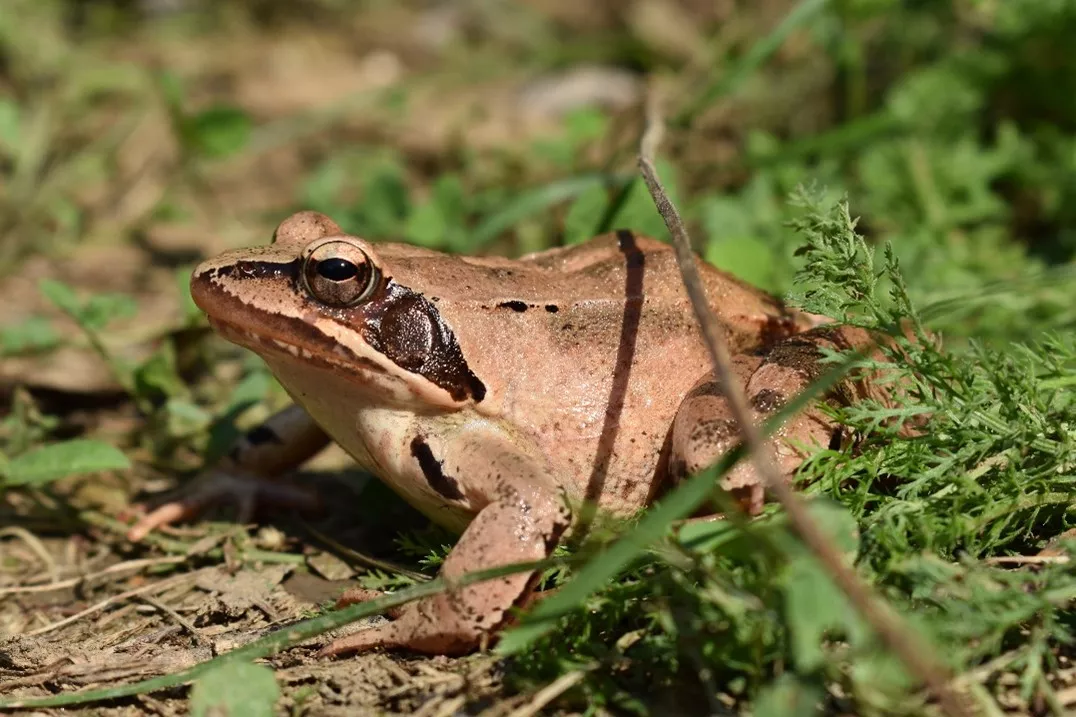ATK researchers studied the sensitivity of overwintering amphibians to the combined effects of climate change and a fungal infection
The researchers at the Department of Evolutionary Ecology of the Plant Protection Institute of the Centre for Agricultural Research (ATK NÖVI) investigated the combined effects of climate change and a fungal infection, chytridiomycosis, on overwintering amphibians. According to their results, the probability of survival during overwintering for agile frogs (Rana dalmatina) is not reduced by the milder winter conditions expected in the near future, nor by the presence of chytridiomycosis. Furthermore, the simultaneous presence of these two stressors did not cause an increased mortality rate. The research paper was published in the prestigious scientific journal Animal Conservation.

Adult agile frog (Photo: Bálint Bombay)
Hibernation often results in high mortality rates, especially in juvenile animals, which can be further exacerbated by unusual winter weather conditions and various diseases. The researchers were curious about how the combined effects of the increasingly frequent mild winters, which are expected in the future due to climate change and the chytridiomycosis disease, which decimates hundreds of amphibian species worldwide, would influence the survival of amphibians during hibernation. For this purpose, juvenile agile frogs were infected with a strain of Batrachochytrium dendrobatidis, the fungus responsible for chytridiomycosis, which is present in Hungary. Afterwards, the infected and control animals were exposed to one of two overwintering environments ‒ long, cold winter (1.5 °C for 91 days) or short, mild winter (4.5 °C for 61 days) ‒ under laboratory conditions.
According to the results of the experiment, agile frogs showed strong resistance to the infection. Before the onset of hibernation, only 37 percent of individuals provided positive samples, while by the end of hibernation, this ratio decreased to 8 percent, and the values indicating the intensity of infection were also low. No mortality was observed in the treatment groups during hibernation. The two types of hibernation conditions, long, cold and short, mild, either alone or combined with the fungal infection, did not cause a significant difference in the reduction of body mass during hibernation. The infection affected individuals in both winter conditions with similarly low rates and severity.
Based on the results, it can be concluded that the milder winters caused by climate change, even in combination with chytridiomycosis, will not reduce the survival chances of overwintering agile frogs, nor increase their susceptibility to infection. However, the generalizability of the results still needs to be tested, as different reactions can be expected in other temperate zone amphibian species that are more sensitive to variable environmental conditions and chytridiomycosis. Therefore, further investigations will be necessary.
The research was carried out with the professional support of the New National Excellence Programme of the Ministry of Innovation and Technology under the codes ÚNKP-21-3 (for Andrea Kásler), ÚNKP-19-4, and ÚNKP-21-5 (for Attila Hettyey), funded from the National Research, Development, and Innovation Fund. Additionally, it received support from the National Research, Development and Innovation Office (NRDI Office) OTKA (K-124375).
Publication:
Andrea Kásler, Dóra Holly, Dávid Herczeg, János Ujszegi, Attila Hettyey (2023). Chytridiomycosis and climate change: exposure to Batrachochytrium dendrobatidis and mild winter conditions do not increase mortality in juvenile agile frogs during hibernation. Animal Conservation. DOI: 10.1111/acv.12851

